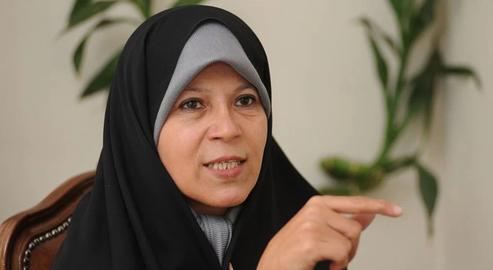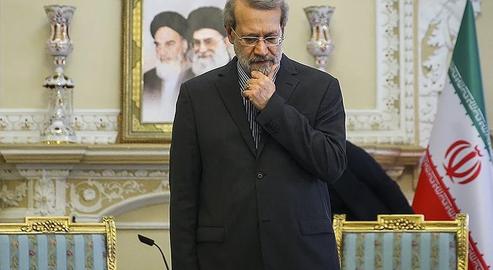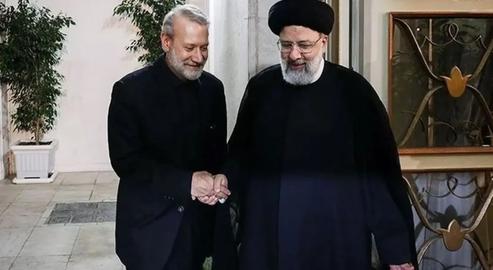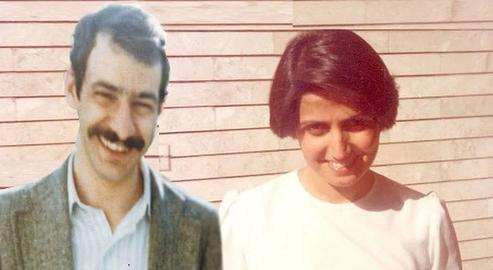Prominent activist Faezeh Hashemi has spoken publicly about Ali Larijani’s surprise ousting from the presidential race, stating that in doing so, Iran’s leadership had abandoned all pretense of an authentic election.
The Guardian Council announced on May 25 that it had disqualified Ali Larijani, former speaker of parliament and a figure trusted by Supreme Leader Ali Khamenei, from running for president. Larijani was widely regarded as the most serious potential competitor to hardline favorite and current Chief Justice Ebrahim Raisi.
In an audio recording obtained by IranWire, Faezeh Hashemi, a vocal reformist in Iran and the daughter of former president Akbar Hashemi Rafsanjani, who was herself an MP from 1996 to 2000, can be heard taking questions on the latest development. She said it had strengthened her resolve to boycott the 2021 vote herself: “These conditions show that voting is the wrong thing to do. It is false and bizarre to participate and endorse these corrupt policies by participating in the election.”
The transcript of what was discussed is below.
***
Did you expect Mr. Larijani to be disqualified?
It was odd and unexpected, but at the same time it was on all of our minds. First of all, it was strange that so many prominent figures had registered, and naturally many of them had to be disqualified. But our assumption was that they would keep at least two significant reformists, and that they would keep on two or three principlists, including Mr. Larijani. The reformists' disqualification was not as shocking as Mr. Larijani's. Like many, I believed Mr. Larijani’s bid to become president would help create a polarized environment: that is, offering up a choice between bad and worse.
Some have compared this disqualification to your father’s disqualification in 2013.
The two are not comparable. My father had long been a critic [of the most prominent political forces at the time], but I have not heard any such criticism from Mr. Larijani. Or at least if he has been critical, it was not significant. That said, we can compare the two in terms of the shock of their disqualification.
What was the Guardian Council’s motive in disqualifying Larijani?
I didn’t expect them to play so hard, and to create such a monopoly. The previous elections were also engineered, but not in such a direct way. This is no longer an election; it’s an appointment, and they have set the stage in such a way that only Mr. Raisi has a chance. This move is much more severe than actions in the past. It appears that they removed Mr. Larijani so Mr. Raisi would not have a rival.
Was Mr. Larijani considered a rival to Mr. Raisi?
Naturally, the gap between them was very large in the polls. This is partly due to the fact that Mr. Raisi has been campaigning for the elections for the last two years; his many trips and speeches reminded everyone that this was an election campaign, and these activities fell outside the framework of his duties as head of the judiciary. For this reason, the distance between him and Mr. Larijani, who had just entered the race and not been heard from for some time, was profound. But I don’t know why they assumed Mr. Larijani might be a danger to Mr. Raisi and removed him. They no longer even have mercy on themselves.
In 2013, when Mr. Hashemi was disqualified, people supported Mr. [Hassan] Rouhani. Do you think there’s a candidate in this election who can win the support of those who had wanted Larijani to be president?
The situation in 2013 could be repeated: a candidate could emerge that people vote for out of sheer anger. So far, what we’ve heard is that the majority of people do not want to vote at all. That was not the case in 2013, when people did go out to vote. At that time, people didn’t feel so negative about participating.
Among the approved candidates, for instance, we now have Mr. Hemmati [Abdolnassser Hemmati, governor of the Central Bank of Iran] Hemmati and Mr. Mehr Alizadeh, [Mohsen Mehr Alizadeh, a reformist ex-governor of Isfahan]. They might be considered representative of the reformists, but – no.
Just today I saw a spokesperson for the Reformist Front announce that they had no candidates in this election. Their participation is now probably in doubt. Honestly, I don’t think a situation like 2013 can occur again, because at that time there was no despair about reformism. There was a kind of strength of heart, and hopes were high. It didn’t feel like the reformists had come to a stalemate, nor that there was no will for reform. The energy was positive. But this state of affairs has not existed for some time now. Non-participation in the election had been a subject of discussion even before this disqualification.
But in one way, it’s a positive thing. Those who were unsure can now decide more clearly. The reformists who fruitlessly gave people hope no longer have a story to tell, and those who already planned to boycott are now in a stronger position. I hope this will strengthen people’s sense of realism.
Mr. Raisi has long been regarded as a [potential’ successor to the Supreme Leader. Do you think there is a connection between the widespread disqualification and full support for Mr. Raisi in the issue of leadership?
I don’t see a direct connection between the disqualifications in this period and the leadership succession. A person who wants to be leader is not supposed to be president. I think it’s a mistake to say that just because Mr. Khamenei was the president and later became the leader, [the next] should follow the same path.
Incidentally, in my opinion, the opposite is true; there are now so many problems in the country that whoever becomes president will end up less popular. You see the situation of Mr. Rouhani now: how dissatisfied everyone is, how many people are against him. See what has become of his popularity among the people. The next president is likely to find himself in the same situation, because the problems are extraordinary, and widespread. Becoming president is now a negative move. They cannot put someone for whom there is public hatred in that leadership position.
Did the disqualifications also affect people like you, who planned to boycott the vote?
I have become stronger in my position after the behavior of the Guardian Council. I’ve come to the conclusion that I was right, those who already did not want to vote were right, and those reformists who preferred to enter, run, and vote were wrong. Of course, the reformists I am talking about are no longer, in my opinion, reformists. But we call them that because we’re used to using this name.
Another thing that made me stronger in my convictions was the leaked audio file of Mr. [Foreign Minister Javad] Zarif's interview. It showed the Foreign Minister is the executor and not the policymaker; in all likelihood, it’s the same with other ministers and the president. In these circumstances, why would anyone, especially the reformists, insist on entering a field where they have no decision-making powers and act only as administrators? Anyone can do that. Why would I run for election in such a situation? Voting is wrong, and to endorse these false positions by running is a bizarre choice.
Some people are still holding for Mr. Larijani to be approved [as a candidate] by a leader's decree. What’s your view on this?
A leader's decree is not the right way. In law, we don’t have any such thing. In 2005, [presidential candidates] Dr. [Mostafa] Moin and Mr. [Mehdi] Karroubi were approved by the leader's decree and it’s possible that this time, too, the status of some candidates' eligibility will change through the same means.
Naturally, I heard from the unofficial media – I don’t know whether it’s true or not – that the reformists were all disqualified, and a list was sent to Mr. Khamenei for approval. If this is true, then a leader's decree no longer makes sense, because if he wanted to do that, he would probably have made changes to the list before it was published.
Related coverage:
Ali Larijani Knocked Out of Iran's Presidential Race as Candidates Announced
Letter to the Wife of Iran’s Chief Justice: Your Husband Killed My Husband
Chasing the Centrist Dream: Ali Larijani Registers for Presidential Race
Firebrands, 'Rentals' and Has-Beens on Reformists' 2021 Candidate List
Ebrahim Raisi’s Presidential Candidacy: A Gamble on Succeeding Khamenei
visit the accountability section
In this section of Iran Wire, you can contact the officials and launch your campaign for various problems



























comments